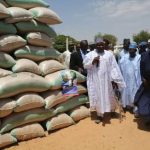The US presidential elections are coming to a finale by Tuesday, November 8, 2016. The effects of the US elections are felt outside the boundaries of the US, and many countries are watching eagerly to see the outcome of the elections
Nigeria is gearing up for elections in 2019. What are the differences between the Nigerian elections and that of the US? Here are some of them:
1. Direct and indirect voting
The US elections focuses on indirect voting, while Nigeria uses the direct voting method. How? While in Nigeria, voters come out and cast their votes state by state for the candidate or party of their choice, the votes are then collated and counted.
In the US, citizens who are registered to vote in one of the fifty states or Washington, D.C. cast ballots for members of the U.S. Electoral College, known as electors. These electors then in turn cast direct votes, known as electoral votes, in their respective state capitals for President and Vice President.
So in essence, US elections are decided by states and not individuals. Each of the states casts as many electoral votes as the total number of Senators and House Representatives in Congress, while Washington, D.C. has three votes.
2. Exceptional cases
Despite the effort put into making the election process smooth, sometimes there are exceptional cases, these are handled differently depending on the country.
In the US, if no candidate receives an absolute majority of votes for President, the House of Representatives chooses the president; if no candidate receives a majority for vice president, then the senate chooses the vice president.
In Nigeria, if no candidate satisfies the requirement, a second election will be held between the two leading candidates within seven days from the pronouncement of the result.
3. Timing
In the US, the day a presidential inauguration occurs is known as “Inauguration Day” and occurs on January 20 or 21st if the 20th is a Sunday. Prior to the Twentieth Amendment, the inauguration date was March 4.
In Nigeria, May 29 is Democracy Day and it is also the national inauguration day. This public holiday commemorates the restoration of democracy in the Federal Republic of Nigeria, when the newly elected Olusegun Obasanjo took office as the President of Nigeria in May 1999 ending multiple decades of military rule that began in 1966 and had been interrupted only by a brief period of democracy from 1979 to 1983.
4. Number of parties
In the US, the political parties with federal representation are: Democratic, Republican and Independent. Usually the presidential race falls between Democratic and Republican candidates.
In Nigeria, the political parties are more numerous,
5. Requirements
In Nigeria, a person shall be qualified for election to the office of President if:
(a) he is a citizen of Nigeria by birth;
(b) he has attained the age of forty years;
(c) he has been educated up to at least School Certificate level or its equivalent.
(d) service in the public or private sector in the Federation in any capacity acceptable to the Independent National Electoral Commission for a minimum of ten years.
While, in the US, the requirements are:
No person except a natural born citizen, or a citizen of the United States, at the time of the adoption of this Constitution, shall be eligible to the office of President; neither shall any person be eligible to that office who shall not have attained to the age of thirty-five years, and been fourteen years a resident within the United States.
Also, no person shall be elected to the office of the President more than twice, and no person who has held the office of President, or acted as President, for more than two years of a term to which some other person was elected President shall be elected to the office of the President more than once.



